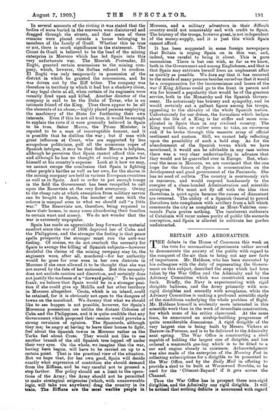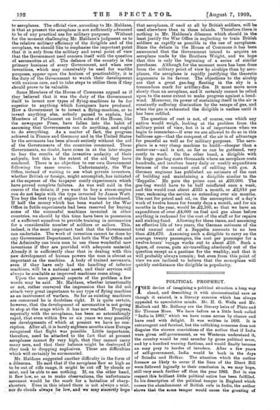BRITAIN AND AERONAUTICS. T HE debate in the House of Commons
this week on the vote for aeronautical experiments 'rather served to demonstrate the anxiety of the public with regard to the conquest of the air than to bring out any new facts of importance. Mr. Haldane, who has been entrusted by his colleagues with the duty of representing the Govern- ment on this subject, described the steps which had been taken by the War Office and the Admiralty and by the Advisory Committee which was constituted some time back. Briefly, the Navy is experimenting with rigid dirigible balloons, and the Army primarily with non- rigid dirigibles and secondly with aeroplanes, while the Advisory Committee is making a profound scientific stedy of the conditions underlying the whole problem of flight. Mr. Haldane himself is evidently more interested in this scientific work than in the work of immediate construction, for which some of his critics clamoured. At the same time, he announced an airship-building programme of quite considerable dimensions. A rigid dirigible of the very largest size is being built by Messrs. Vickers at Barrow-in-Furness, and is °to be delivered to the Admiralty next spring. The War Office is constructing a shed capable of holding the largest, size of dirigible, and has ordered a mammoth gas-bag which is to be fitted to a car and engine already in existence. Acknowledgment was also made of the enterprise of the Morning Post in collecting subscriptions for a dirigible to be presented to the War Office, and by the Daily Mail in offering to provide a shed to be' built at Wormwood Scrubbs, to he used for the Clement-Bayard' if it gets across the Channel.
Thus the War Office has in prospect three non-rigid dirigibles, and the Admiralty one rigid dirigible. It will be noticed that nothing definite is announced with regard to aeroplanes. The official view, according to Mr. Haldane, its that at present the aeroplane is not sufficiently advanced to be of any practiCal use for military purposes: Without for the moment challenging Mr. Haldane's judgment as to the relative military efficiency of the dirigible and of the aeroplane, we should like to emphasise the important point that it is only from the military and naval point of view that the .Government need concern itself with the question of aeronautics at all. The defence of the country is the primary business of every Government, and when new inventions, which may conceivably be used for warlike purposes, appear upon the horizon of practicability, it is the duty of the Government to watch their development with anxious care, and to take steps to utilise them if they should prove to be valuable.
Some Members of the House of Commons argued as if they believed that it was the duty of the Government itself to invent new types of flying-machines to be far superior to anything which foreigners have produced. How a Government is to invent a flying-machine, or to invent anything else, nobody paused to explain, but Members of Parliament on both sides of the House, like the newspaper Press, have fallen into the habit of assuming that Governments can do anything, and ought to do everything. As a matter of fact, the progress achieved in France and Germany and in the United States by the aeronauts has been almost entirely without the aid of the .Governments of the countries concerned. These Governments, no doubt, have come in at the' later stages to buy the results of the inventive audacity of their subjects, but this is the extent of the aid they have rendered. There is no objection to our own Government following the same course. Unfortunately, the War Office, instead of waiting to see what private inventors, whether British or foreign, might accomplish, has initiated at the expense of the taxpayer costly experiments which have proved complete failures. As was well said in the course of the debate, if you want to buy a steam-engine you do not begin with the type invented by James Watt. You buy the best type of engine that has been introduced. If half the money which has been wasted by the War Office in futile experiments had been reserved for buying some of the successful machines invented in other countries, we should by this time have been in possession of a sufficient squadron to provide training in aeronautics for a considerable number of soldiers or sailors. This, indeed, is the most important task that the Government can undertake. The work of invention cannot be done by any Government Department, but both 'the War Office and the Admiralty can train men to use these wonderful new inventions if they are provided with adequate material. Already it is sufficiently clear that in dealing with this new development of human powers the man is almost as important as the machine. A body of trained aeronauts, even if they have only had the handling of inferior machines, will be a national asset, and their services will always be available as improved machines come along. Upon the more general aspects of the problem a few words may be said. Mr. Haldane, whether intentionally or not, rather conveyed the impression that he did not attach very great importance to any type of flying machine as an instrument of warfare. So far as existing machines are concerned he is doubtless right. It is quite certain, however, that the development of aeronautics is not going to stop at the stage which it has now reached. Progress, especially with the aeroplanes, has been so astonishingly rapid, that even within five or six years we may possibly see developments of which at present we have no con- ception. After all, it is barely eighteen months since Europe recognised that flight was possible. 'Little importance, therefore, need be attached to the fact that at present aeroplanes cannot fly very high, that they cannot carry many men, and that their balance might be destroyed if they took to dropping explosives. These are difficulties which will certainly be surmounted.
Mr. Haldane, suggested another difficulty in the form of a dilemma. He said that if the aeroplane flew so high as to be out of rifle range, it might be cut off by clouds or mist, and be able to see nothing. If, on the other hand, it flew low, so as to make observations, the 'unfortunate aeronaut would be the mark for a battalion of sharp- shooter's. Eienin this island there' is 'not alwiiys a mist, nor do clouds always lie low, and we may sincerely hope that aeroplanes, if used at all by British soldiers, will be used elsewhere than in these islands. Therefore there.is nothing in Mr. Haldane's dilemma which should in the least justify the War Office in neglecting to train British soldiers as rapidly as possible in the use of aoroplanea. Since the debate in the House of Commons it has been announced that the Government intend to acquire an aeroplane made by the Brothers Wright, and we hope that this is only the beginning of a series of similar purchases. Although for the moment more has been done from the military point of view by airships than by aero- planes, the aeroplane is rapidly justifying- the theoretic arguments in its favour. The objections to the airship are that a great gas-bag floating in the sky is a tremendous mark for artillery-fire. It must move more slowly than an aeroplane, and it certainly cannot be relied upon to the same extent to make progress against a head- wind. Moreover, its power of sustaining itself in the air is constantly suffering diminution by the escape of gas, and when the gas is exhausted the dirigible is useless until it has been refilled.
The question of cost is not, of course, one which any nation would weigh, looking at the problem from, the military point of view, but it is of importance when we begin to remember—if ever we are allowed to do so in this bellicose age—that the conquest of the air is of advantage for peaceful as well as for military purposes. The aero- plane is a very cheap machine to, build—cheaper than a motor-car—and is not, as far as can be gathered, very costly to work. On the other hand, a dirigible with its huge gas-bag costs thousands where an aeroplane costs hundreds, and involves heavy daily or weekly expenditure because of the constant cost of refilling with gas. A German engineer has published an estimate of the cost of building and maintaining a dirigible similar to the 'Zeppelin.' He puts the prime cost at £30,000. The gas-bag would have to be half reinflated once a week, and this would cost about £335 a month, or £2,010 per year, reckoning the service as extending over six months. The cost for petrol and oil, on the assumption of a day's work of twelve hours for twenty days a mouth, and for six months in the year, would be £2,160, so that we have an expenditure of over £4,000 on fuel and gas alone before anything is reckoned for the cost of the staff or for repairs and sinking fund. Allowing for these items, and assuming an effective life of two years, the German estimate of the total annual cost of a Zeppelin amounts to no less than £24,670. Assuming such a dirigible to carry on the average twenty passengers, the cost per passenger for a twelve-hours' voyage works out to about £10. Such a figure, of course, puts air-travelling absolutely out of the question except as a pastime for the wealthy, and that it will probably always remain; but even from this point of view we are inclined to believe that the monoplane will quickly outdistance the dirigible in popularity.







































 Previous page
Previous page